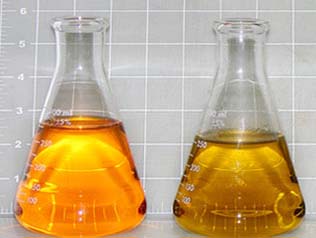In our work, we are frequently asked whether premium diesel fuel is superior to standard diesel fuel. And our short answer is always a resounding, “Yes.” But more explanation is needed when it comes to the other big question regarding premium diesel fuel – such as whether it is worth its higher price.
Premium diesel from the pump contains more detergent and additives than standard diesel fuel, which helps to improve an engine’s combustion performance. Depending on engine design, using a premium diesel usually results in an increase in performance and MPG, as well as reduced engine emissions and similar benefits.
So yes, premium diesel is better than standard diesel. But is it worth its higher price tag?
On that matter, we are not so sure. The main issue is that premium diesel fuels could be much better considering the significant extra cost per litre. The additional detergent currently included is barely enough to retain a clean engine on most fuel systems and engine types and fails to actively remove existing deposits. Unfortunately, we find that diesel vehicles solely using premium diesel fuels continue accumulating deposits. Not so much in the fuel system, but in the combustion area, emission components (EGR, DPF), intake manifold, intake valves, etc. Using a premium diesel will undoubtedly delay the formation of carbon deposits in these areas. But don’t expect miracles in regards to cleaning performance. The increased bio-diesel percentage contributes to an increase in fuel system contamination, biological degradation, and carbon build-up. Unfortunately, current fuels do not do enough to address these issues.
Please note, in the manufacturers’ defense, there are regulatory considerations, such as the outdated BS EN590 specification, that control what additives can be included in fuel. But those regulations are irrelevant to whether premium diesel, as it is made today, is a good value for the price you pay at the pump.
So if premium fuel isn’t worth the extra cost and standard diesel is lacking, what should you do? We suggest adding a high-quality diesel fuel conditioner with combustion catalyst technology to standard diesel fuel. Doing this will generally create a fuel that will outperform a premium diesel and be more cost-effective per tank. We have substantial testimony, as well as research data, that supports this. More complete fuel conditioners contain effective technologies to proactively clean and remove existing deposits, lubricate the diesel pump, remove water, prevent fuel degradation or contamination, lower emissions, improve performance, increase MPG, and so on.
It is simply a case of weighing the benefits of premium diesel versus the additional benefits of a fuel conditioner while also considering convenience and cost.
Another issue to consider in this debate is consistency. It is not uncommon to encounter variances in quality with fuel from the same gas station. From what we understand, distribution agreements between the fuel retailers and refineries call for gas stations to sell fuel from the nearest refinery in the area, regardless of the brand. Additive packs are added at the refinery or directly into the station fuel tanks.
The same variance applies to petrol. Regular octane tests will reveal startling differences in fuel octane. One week it tests at 95.6, the next at 96.8, and so forth. As you can imagine, this makes testing octane boosters extremely difficult because base fuels can be inconsistent.
Some advice we will add is to “know” your petrol station. When possible, purchase fuels from stations you know have a high fuel turnover. Try to avoid filling your vehicle from tanks running low and those that have just been filled, as this can agitate deposits and moisture. If you see a tanker, come back later. A fuel conditioner should protect against fuel’s inherent issues and inconsistencies.
If you require any advice or help, please don’t hesitate to contact us and either I or a member of my team will be pleased to assist you.



 categories
categories